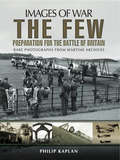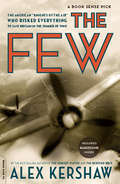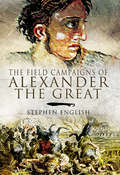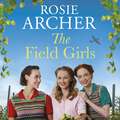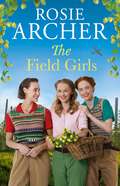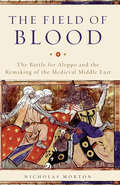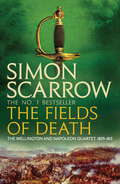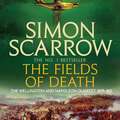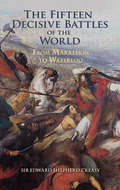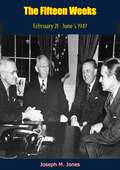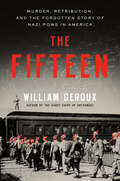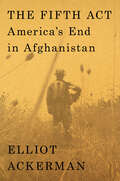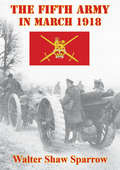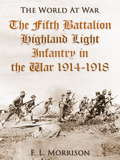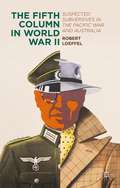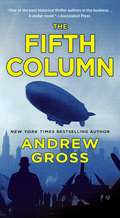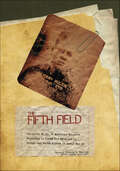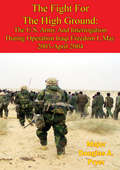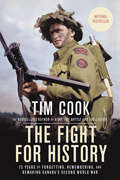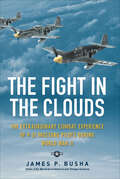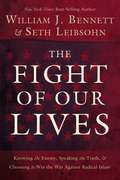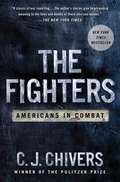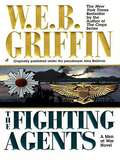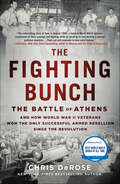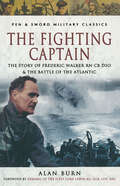- Table View
- List View
The Few: Rare Photographs From Wartime Archives (Images of War)
by Philip KaplanThis new addition to the Images of War series is sure to prove welcome, illustrating as it does the preparatory stages of the iconic Battle of Britain. Whilst the country geared up for action, the air forces rallied, readying the high-performance Hawker Hurricane and Supermarine Spitfire fighters that were to characterize this aerial conflict so dramatically. The nine month period that elapsed prior to the German dive-bombing attacks on British shipping in the English Channel (an event that signaled, what Winston Churchill labeled, The Battle of Britain) is the focus of this photographic study. The so-called 'Phoney War' that played out under the leadership of William Maxwell Aitken, the British Minister of Aircraft Production, saw all arms of the Air Force tasked with the job of ensuring that Britain and its forces were prepared for the German challenge that existed on the horizon.Images of some of pilots and various aircrews preparing for battle feature alongside shots of Spitfires in waiting, volunteer ambulance crews in readiness, civilians filling sandbags on the beaches of Britain to be used in an effort to protect its buildings. All these images serve to illustrate the times at hand, and the co-operative, resilient spirit of British pilots and civilians during this anticipatory period of uncertainty. Military enthusiasts and historians of the Second World War will be intrigued by the new insights opened up by these images. All are accompanied by Kaplan's illuminating prose, setting each image within context. A second volume will follow, focussing on the Battle itself, and The Few who achieved so much.
The Few: The American "Knights of the Air" Who Risked Everything to Fight in the Battle of Britain (Playaway Adult Nonfiction Ser.)
by Alex KershawFrom the author of national bestsellers The Bedford Boys and The Longest Winter comes "a rousing tale of little-known heroes" (Booklist).The Few tells the dramatic and unforgettable story of eight young Americans who joined Britain's Royal Air Force, defying their country's neutrality laws and risking their U.S. citizenship to fight side-by-side with England's finest pilots in the summer of 1940-over a year before America entered the war. Flying the lethal and elegant Spitfire, they became "knights of the air" and with minimal training but plenty of guts, they dueled the skilled and fearsome pilots of Germany's Luftwaffe. By October 1940, they had helped England win the greatest air battle in the history of aviation. Winston Churchill once said of all those who fought in the Battle of Britain, "Never in the field of human conflict was so much owed by so many to so few." These daring Americans were the few among the "few." Now, with the narrative drive and human drama that made The Bedford Boys and The Longest Winter national bestsellers, Alex Kershaw tells their story for the first time.
The Field Campaigns of Alexander the Great
by Stephen EnglishAlexander the Great is one of the most famous men in history, and many believe he was the greatest military genius of all time (Julius Caesar wept at the feet of his statue in envy of his achievements). Most of his thirteen year reign as king of Macedon was spent in hard campaigning which conquered half the then-known world, during which he never lost a battle. Besides the famous set-piece battles (Granicus, Issus, Gaugamela, Hydaspes), Alexander's army marched thousands of miles through hostile territory, fighting countless smaller actions and calling for a titanic logistical effort.There is a copious literature on Alexander the Great, but most are biographies of the man himself, with relatively few recent works analyzing his campaigns from a purely military angle. This book will combine a narrative of the course of each of Alexander's campaigns, with clear analysis of strategy, tactics, logistics etc. This will combine with Stephen English's The Army of Alexander the Great and The Sieges of Alexander the Great, to form a very strong three-volume examination of one of the most successful armies and greatest conquerors ever known.
The Field Girls
by Rosie ArcherGosport, 1943.Eadie, Joy and Maureen are all doing their bit to help Britain win the war. Their work at Priddy's munitions factory is dangerous and gruelling, but undoubtedly necessary. However, when an explosion at the factory almost kills several of the workers, the girls decide it's time to find another way to contribute.Joy sees an advertisement in the newsagents, seeking Hop Pickers in Hampshire, accommodation provided. They leave Gosport, ready for a new adventure. But what they discover about each other and the people they meet over the summer, will change their lives forever. A heart-warming saga about friendship, love and the hardest days of war. Perfect for fans of Elaine Everest and Pam Howes.
The Field Girls: a heartwarming WWII saga
by Rosie ArcherGosport, 1943.Eadie, Joy and Maureen are all doing their bit to help Britain win the war. Their work at Priddy's munitions factory is dangerous and gruelling, but undoubtedly necessary. However, when an explosion at the factory almost kills several of the workers, the girls decide it's time to find another way to contribute.Joy sees an advertisement in the newsagents, seeking Hop Pickers in Hampshire, accommodation provided. They leave Gosport, ready for a new adventure. But what they discover about each other and the people they meet over the summer, will change their lives forever. A heart-warming saga about friendship, love and the hardest days of war. Perfect for fans of Elaine Everest and Pam Howes.
The Field of Blood: The Battle for Aleppo and the Remaking of the Medieval Middle East
by Nicholas MortonA history of the 1119 Battle of the Field of Blood, which decisively halted the momentum gained during the First Crusade and decided the fate of the Crusader states In 1119, the people of the Near East came together in an epic clash of horses, swords, sand, and blood that would decide the fate of the city of the Aleppo--and the eastern Crusader states. Fought between tribal Turkish warriors on steppe ponies, Arab foot soldiers, Armenian bowmen, and European knights, the battlefield was the amphitheater into which the people of the Near East poured their full gladiatorial might. Carrying a piece of the true cross before them, the Frankish army advanced, anticipating a victory that would secure their dominance over the entire region. But the famed Frankish cavalry charge failed them, and the well-arranged battlefield dissolved into a melee. Surrounded by enemy forces, the crusaders suffered a colossal defeat. With their advance in Northern Syria stalled, the momentum of the crusader conquest began to evaporate, and would never be recovered.
The Fields of Death (The Wellington and Napoleon Quartet)
by Simon ScarrowTHE FIELDS OF DEATH is the epic final novel in Simon Scarrow's bestselling Wellington and Napoleon Quartet. Essential reading for fans of Bernard Cornwell.1809. Viscount Wellington and Emperor Napoleon Bonaparte have made their mark as military commanders. Lifelong enemies, they both believe their armies are strong enough to destroy any rival. But in war victory can never be certain.While Wellington's success continues in Spain, Napoleon feels the sting of failure. Yet despite a disastrous Russian campaign and humiliating defeat at Leipzig, he persists in fighting on.With Napoleon's power waning, the newly titled Duke of Wellington is perfectly placed to crush the tyrant. But his enemy refuses to surrender, and so the two giants must face a final reckoning on the bloody battlefield of Waterloo...
The Fields of Death: (Revolution 4) (The Wellington and Napoleon Quartet)
by Simon ScarrowTHE FIELDS OF DEATH is the epic final novel in Simon Scarrow's bestselling Wellington and Napoleon Quartet. Essential reading for fans of Bernard Cornwell.1809. Viscount Wellington and Emperor Napoleon Bonaparte have made their mark as military commanders. Lifelong enemies, they both believe their armies are strong enough to destroy any rival. But in war victory can never be certain.While Wellington's success continues in Spain, Napoleon feels the sting of failure. Yet despite a disastrous Russian campaign and humiliating defeat at Leipzig, he persists in fighting on.With Napoleon's power waning, the newly titled Duke of Wellington is perfectly placed to crush the tyrant. But his enemy refuses to surrender, and so the two giants must face a final reckoning on the bloody battlefield of Waterloo...(P)2017 Headline Digital
The Fifteen Decisive Battles of the World: From Marathon to Waterloo (Dover Military History, Weapons, Armor Ser.)
by Edward Shepherd CreasyRanging from Marathon to Waterloo, this classic of military history chronicles battles that changed the course of history. Originally published in 1851, at the zenith of British imperial power, it found an eager audience of readers who wanted to understand how Britain had achieved its tremendous influence and how long it would last. Since then, these chronicles of ancient and modern military confrontations have informed and inspired generations of students and armchair historians.Educated at Eton College and the University of Cambridge, Sir Edward Shepherd Creasy was called to the Bar in 1837, appointed to the faculty of the University of London in 1840, and served as Chief Justice of Ceylon from 1860 to 1870. Creasy's scholarship and literary skill are complemented by his judicial attitude, which endows this book with a fair-minded, nonpartisan approach. He prefaces each battle with an introduction that explains the circumstances surrounding the war, as well as an afterword that considers how history might have changed had victory gone to the other side. Linking passages offer valuable insights into historical events that occurred between the major encounters. Influential and ever-popular, this book offers authoritative and entertaining analyses of the conflicts that shaped world history.
The Fifteen Weeks (February 21 - June 5, 1947)
by Joseph M. JonesA DRAMATIC AND REVEALING ACCOUNT, FROM INSIDE THE GOVERNMENT, OF THE MOMENTOUS DAYS IN WHICH AMERICA ASSUMED THE RESPONSIBILITY OF WORLD LEADERSHIP.First published in 1955, Joseph M. Jones’ memoirs The Fifteen Weeks chronicle his role in the development of the Truman Doctrine and the Marshall Plan.“The fifteen weeks which form the title and subject of this book comprise the period in 1947 when the United States stepped out irrevocably and wholeheartedly as leader upon the world stage....“The greatness of a nation, like the greatness of an individual, is in the last analysis a mystery. We do not know why at one time immense exertions and far-reaching vision are more prevalent than at others. Yet to look within, to account for the obvious factors in the situation is highly useful. That function is performed in a book which for readability and for responsible narration would be hard to surpass.”—August Heckscher in the New York Herald Tribune.
The Fifteen: Murder, Retribution, and the Forgotten Story of Nazi POWs in America
by William GerouxThe revelatory true story of the long-forgotten POW camps for German soldiers erected in hundreds of small U.S. towns during World War II, and the secret Nazi killings that ensnared fifteen brave American POWs in a high-stakes showdown. &“In the pantheon of American history, it&’s very hard to find compelling, original stories, and even harder to find authors worthy of them. In The Fifteen, William Geroux delivers the goods.&”—John U. Bacon, New York Times bestselling author of The Great Halifax ExplosionThe American government was faced with an unprecedented challenge: where to house the nearly 400,000 German prisoners of war plucked from the battlefield and shipped across the Atlantic. On orders from President Franklin D. Roosevelt, the Department of War hastily built hundreds of POW camps in the United States. Today, traces of those camps—which once dotted the landscape from Maine to California—have all but vanished. Forgotten, too, is the grisly series of killings that took place within them: Nazi power games playing out in the heart of the United States.Protected by the Geneva Convention, German POWs were well-fed and housed. Many worked on American farms, and a few would even go on to marry farmers&’ daughters. Ardent Nazis in the camps, however, took a dim view of fellow Germans who befriended their captors.Soon, the killings began. In camp after camp, Nazis attacked fellow Germans they deemed disloyal. Fifteen were sentenced to death by secret U.S. military tribunals for acts of murder. In response, German authorities condemned fifteen American POWs to the same fate, and, in the waning days of the war, Germany proposed an audacious trade: fifteen German lives for fifteen American lives.Drawing on extensive research, journalist and author William Geroux shines a spotlight on this story of murder and high-stakes diplomacy, and on the fifteen American lives that hung in the balance—from a fearless P-51 Mustang fighter pilot to a hot-tempered lieutenant colonel nicknamed &“King Kong.&”Propulsive and vividly rendered, The Fifteen reminds us that what happens to soldiers after they exit the battlefield can be just as harrowing as what they experience on it.
The Fifth Act: America's End in Afghanistan
by Elliot AckermanA powerful and revelatory eyewitness account of the American collapse in Afghanistan, its desperate endgame, and the war&’s echoing legacyElliot Ackerman left the American military ten years ago, but his time in Afghanistan and Iraq with the Marines and later as a CIA paramilitary officer marked him indelibly. When the Taliban began to close in on Kabul in August 2021 and the Afghan regime began its death spiral, he found himself pulled back into the conflict. Afghan nationals who had worked closely with the American military and intelligence communities for years now faced brutal reprisal and sought frantically to flee the country with their families. The official US government evacuation effort was a bureaucratic failure that led to a humanitarian catastrophe. With former colleagues and friends protecting the airport in Kabul, Ackerman joined an impromptu effort by a group of journalists and other veterans to arrange flights and negotiate with both Taliban and American forces to secure the safe evacuation of hundreds. These were desperate measures taken during a desperate end to America's longest war. For Ackerman, it also became a chance to reconcile his past with his present. The Fifth Act is an astonishing human document that brings the weight of twenty years of war to bear on a single week, the week the war ended. Using the dramatic rescue efforts in Kabul as his lattice, Ackerman weaves a personal history of the war's long progression, beginning with the initial invasion in the months after 9/11. It is a play in five acts, the fifth act being the story&’s tragic denouement, a prelude to Afghanistan's dark future. Any reader who wants to understand what went wrong with the war&’s trajectory will find a trenchant account here. But The Fifth Act also brings readers into close contact with a remarkable group of characters, American and Afghan, who fought the war with courage and dedication, and at great personal cost. Ackerman's story is a first draft of history that feels like a timeless classic.
The Fifth Army In March 1918 [Illustrated Edition]
by Walter Shaw Sparrow[Illustrated with 19 maps]On March 21st, 1918, Ludendorff launched the massive offensive that had been feared by the Allies for some time. The target for their attack was the Fifth Army commanded by General Sir Hubert Gough; weak in numbers and even weaker in the lack of entrenchments and fortifications in the front line which they had only just taken over from French divisions. The effect was shattering, the 'hurricane bombardment' was murderous the Germans fired one million artillery shells at the British lines held by the Fifth Army - over 3000 shells fired every minute. The famous Stormtroopers, specially trained and equipped, attacked with skill and determination, bypassing islands of resistance, sowing terror with flame-throwers rushing towards their objectives. The Fifth army fought valiantly and suffered greatly and no less than 21,000 British soldiers had been captured, many still stupefied by the bombardment, and, much ground that had been bought at huge human cost during the Battle of the Somme, lost. However, the shell-holed ground of the Somme battlefield proved to be the best ally of the British as it slowed the German advance; starving German troops stopped to loot abandoned British supplies. As the Germans slowed the remaining troops of Fifth and the other British Armies stiffened their resistance and eventually the front was knitted back together with the aid of the French and American forces.It was to be the last roll of the dice for the German Army in the First World War, the last real chance of victory, almost a quarter of a million of their best soldiers fell on their side during March and April 1918. The Gamble had failed however and the Allies would turn back the tide a few months later hounding the Germans back to their own borders and final capitulation.
The Fifth Battalion Highland Light Infantry in the War 1914-1918 (The World At War)
by F. L. MorrisonExcerpt from contents of book: ”Within a week our Brigade found itself at Dunfermline, and a few days later we were at Leven, with two companies on duty at the docks at Methil. The Leven companies did uninterrupted training, the Methil companies uninterrupted guards, and to the credit of the latter no one was drowned on these inky nights in the docks. It was there one night a small but gallant officer was going his rounds. One sentry was posted in mid-air on a coal chute, and to challenge persons approaching his post was one of his duties. On the approach of the officer there was no challenge, so to find the reason of this the officer climbed up the ladder and found the sentry, who explained he had seen something "right enuff, " but thought it was "one of them things they tie ships to"-in other words a bollard."
The Fifth Column in World War II: Suspected Subversives In The Pacific War And Australia
by Robert LoeffelThe Fifth Column: A Novel
by Andrew Gross“One of the best historical thriller authors in the business... [A] stellar novel.” —Associated Press#1 New York Times bestselling author of The One Man Andrew Gross once again delivers a tense, stirring thriller of a family torn apart set against the backdrop of a nation plunged into war.February, 1939. Europe teeters on the brink of war. In New York City, twenty-two thousand cheering Nazi supporters pack Madison Square Garden for a raucous, hate-filled rally. In a Hell’s Kitchen bar, Charles Mossman is reeling from the loss of his job and the demise of his marriage when a group draped in Nazi flags barges in. Drunk, Charlie takes a swing at one with tragic results and a torrent of unintended consequences follows. Two years later. America is wrestling with whether to enter the growing war. Charles’s estranged wife and six-year-old daughter, Emma, now live in a quiet brownstone in the German-speaking New York City neighborhood of Yorkville, where support for Hitler is common. Charles, just out of prison, struggles to put his life back together, while across the hall from his family, a kindly Swiss couple, Trudi and Willi Bauer, have taken a liking to Emma. But Charles begins to suspect that they might not be who they say they are. As the threat of war grows, and fears of a “fifth column”—German spies embedded into everyday life—are everywhere, Charles puts together that the seemingly amiable Bauers may be part of a sinister conspiracy. When Pearl Harbor is attacked and America can no longer sit on the sideline, that conspiracy turns into a deadly threat with Charles the only one who can see it and Emma, an innocent pawn.
The Fifth Field: The Story of the 96 American Soldiers Sentenced to Death and Executed in Europe and North Africa in World War II
by French L. MacLeanUnnamed Graves, a Secret Cemetery, Files Closed to the Public and Stored in "The Vault." During World War II, in the North African/Mediterranean and European Theaters of Operation, 96 American soldiers were convicted by Army General Courts-Martial and executed for desertion, murder and rape. Their victims were 26 fellow American soldiers and 71 British, French, Italian, Polish and Algerian civilians. The executions were not ad hoc killings. General Eisenhower, or another theater commander, approved every proceeding, but the Army did not trumpet the crimes. After the war, the Army searched for a suitable site to inter the remains of all 96 men. It chose a plot of land adjacent to – but technically outside of – the World War I American cemetery of Oise-Aisne. The area is separated from the main cemetery by a high stone wall, concealed from view, and is closed to casual visitors. Called "Plot E" by the staff, others refer to it as "The Fifth Field." The judicial files on the 96 were even harder to find – until now.
The Fight For The High Ground: The U.S. Army And Interrogation During Operation Iraqi Freedom I, May 2003-April 2004
by Major Douglas A. PryerDuring Operation IRAQI FREEDOM I (OIF I), U.S. soldiers waged a desperate war against a growing insurgency. Mounting U.S. casualties became the catalyst for a hidden "war within the war." Arrayed on one side of this secret conflict were leaders who believed that the "ends justify the means." Opposing this camp were those who believed that U.S. soldiers do not torture because of the higher ideals to which all Americans should subscribe. This clandestine conflict was waged at every level of command, from the fields of Iraq to Washington, D.C. In this history, the adverse influence of the ends-justify-the-means camp in Iraq is charted. Conversely, interrogation operations within the largest division task force and brigade combat team of OIF I are explored to explain why most interrogators treated detainees humanely. Those deficiencies of Army doctrine, force structure, and training that enabled harsh interrogation policies to sometimes trump traditional virtues are explained. Lastly, the Army's recent dramatic improvements with regard to interrogations are summarized and still-existing deficiencies are noted. This history concludes that the damage done by abusive interrogations will be felt for years to come--and that much work still needs to be done to ensure such damage never recurs.
The Fight for History: 75 Years of Forgetting, Remembering, and Remaking Canada's Second World War
by Tim CookA masterful telling of the way World War Two has been remembered, forgotten, and remade by Canada over seventy-five years. The Second World War shaped modern Canada. It led to the country's emergence as a middle power on the world stage; the rise of the welfare state; industrialization, urbanization, and population growth. After the war, Canada increasingly turned toward the United States in matters of trade, security, and popular culture, which then sparked a desire to strengthen Canadian nationalism from the threat of American hegemony. The Fight for History examines how Canadians framed and reframed the war experience over time. Just as the importance of the battle of Vimy Ridge to Canadians rose, fell, and rose again over a 100-year period, the meaning of Canada's Second World War followed a similar pattern. But the Second World War's relevance to Canada led to conflict between veterans and others in society--more so than in the previous war--as well as a more rapid diminishment of its significance. By the end of the 20th century, Canada's experiences in the war were largely framed as a series of disasters. Canadians seemed to want to talk only of the defeats at Hong Kong and Dieppe or the racially driven policy of the forced relocation of Japanese-Canadians. In the history books and media, there was little discussion of Canada's crucial role in the Battle of the Atlantic, the success of its armies in Italy and other parts of Europe, or the massive contribution of war materials made on the home front. No other victorious nation underwent this bizarre reframing of the war, remaking victories into defeats. The Fight for History is about the efforts to restore a more balanced portrait of Canada's contribution in the global conflict. This is the story of how Canada has talked about the war in the past, how we tried to bury it, and how it was restored. This is the history of a constellation of changing ideas, with many historical twists and turns, and a series of fascinating actors and events.
The Fight in the Clouds: The Extraordinary Combat Experience of P-51 Mustang Pilots During World War II
by James P. BushaWorld War II American P-51 Mustang pilots share their spellbinding, real-life tales from the cockpit in this collection.The North American Aviation P-51 Mustang first started appearing in real numbers in 1943, at the climax of the Allied campaign in World War II. Able to fly long ranges, it was the perfect escort, keeping bombers protected all the way from Allied bases in Europe, the Mediterranean, and the Pacific to a variety of Axis industrial targets and military installations and back. The Mustang would go on to provide pivotal air support on D-Day, and by the end of the war, the P-51 would be responsible for nearly half of all enemy aircraft shot down.In The Fight in the Clouds, aviation writer and EAA Warbirds of America editor James P. Busha draws on interviews conducted with dozens of veteran P-51 pilots to trace the progress of war through the men’s exciting, chronologically organized experiences. You’ll encounter:Mustangs tangling with Soviet-built YaksA Mustang ace shooting down an Me 262 StormbirdAn epic long-range battle over the Pacific OceanAnd a score of other riveting accounts underscoring the P-51’s versatility and its vital importance to the Allied victoryBolstered by Busha’s own commentary and historical analysis, along with a gallery of rare black-and-white period photographs, The Fight in the Clouds offers a cockpit-seat view of one of WWII’s most celebrated aircraft and the men who bravely flew it into harm’s way.
The Fight of Our Lives: Knowing the Enemy, Speaking the Truth, and Choosing to Win the War Against Radical Islam
by William J. Bennett Seth LeibsohnTen Years Ago, when radical Islamist terrorists used three U.S. airplanes to kill nearly three thousand of our countrymen, America was angry. It was a focused and justified anger; one that generated clear objectives and a willingness to meet them. But that resolve has deteriorated so much that many of our nation's top political and military leaders will scarcely utter the word that brought us here, "terrorism," let alone the ideology that fuels it, "radical Islam." In The Fight of Our Lives, William J. Bennett and Seth Leibsohn examine the devolution of America's post-9/11 tenacity and how this country's well-meaning culture of religious tolerance, coupled with soft and apologetic political leadership, has placed us squarely in the pocket of radical Islamists who have made clear their intention to obliterate everything we value. America's devotion to political correctness has crippled its ability to accurately interpret and respond to the motives of its fiercest enemies. Unless we change course and re-engage the fight, the costs of our tolerance will prove tragic and immeasurable. The Fight of Our Lives helps readers refocus, to reframe and understand the threats we face. By surveying and explaining the current scene, Bennett and Leibsohn point the way to a future in which our enemies are properly acknowledged and firmly opposed.
The Fighters: Americans In Combat In Afghanistan And Iraq
by C. J. Chivers<P><P>Pulitzer Prize winner C.J. Chivers’ unvarnished account of modern combat, told through the eyes of the fighters who have waged America’s longest wars. <P><P>More than 2.7 million Americans have served in Afghanistan or Iraq since September 11, 2001. C.J. Chivers reported from both wars from their beginnings. <P><P>The Fighters vividly conveys the physical and emotional experience of war as lived by six combatants: a fighter pilot, a corpsman, a scout helicopter pilot, a grunt, an infantry officer, and a Special Forces sergeant. <P><P>Chivers captures their courage, commitment, sense of purpose, and ultimately their suffering, frustration, and moral confusion as new enemies arise and invasions give way to counterinsurgency duties for which American forces were often not prepared. <P><P>The Fighters is a tour de force, a portrait of modern warfare that parts from slogans to do for American troops what Stephen Ambrose did for the G.I.s of World War II and Michael Herr for the grunts in Vietnam. Told with the empathy and understanding of an author who is himself an infantry veteran, The Fighters presents the long arc of two wars. <P><b>A New York Times Bestseller</b>
The Fighting Agents (Men at War #4)
by W.E.B. GriffinThe Philippines, 1943: As the ragged remnants of the American forces stand against the might of the Imperial Japanese Army, a determined cadre of OSS agents becomes their only contact with the outside world-and their only hope for survival.<P><P> In Budapest, an agent must keep two key prisoners from being interrogated by the Gestapo, his only choice to rescue them - or kill them. In Washington, an Army Air Corps captain suddenly finds himself assigned deep under the sea, his mission an improbable one involving submarines, supplies, arms, and gold. And in Cairo, an undistinguished pilot named Darmstadter wonders why in the world the OSS is interested in his services, only to find out in the most dramatic way possible - and become a hero in the process.
The Fighting Bunch: The Battle of Athens and How World War II Veterans Won the Only Successful Armed Rebellion Since the Revolution
by Chris DeRoseIn The Fighting Bunch: The Battle of Athens and How World War II Veterans Won the Only Successful Armed Rebellion Since the Revolution, New York Times bestselling author Chris DeRose reveals the true, never-before-told story of the men who brought their overseas combat experience to wage war against a corrupt political machine in their hometown.Bill White and the young men of McMinn County answered their nation's call after Pearl Harbor. They won the freedom of the world and returned to find that they had lost it at home. A corrupt political machine was in charge, protected by violent deputies, funded by racketeering, and kept in place by stolen elections - the worst allegations of voter fraud ever reported to the Department of Justice, according to the U.S. Attorney General. To restore free government, McMinn's veterans formed the nonpartisan GI ticket to oppose the machine at the next election.On Election Day, August 1, 1946, the GIs and their supporters found themselves outgunned, assaulted, arrested, and intimidated. Deputies seized ballot boxes and brought them back to the jail. White and a group of GIs - "The Fighting Bunch" - men who fought and survived Guadalcanal, the Bulge, and Normandy, armed themselves and demanded a fair count. When they were refused the most basic rights they had fought for, the men, all of whom believed they had seen the end of war, returned to the battlefield and risked their lives one last time. For the past seven decades, the participants of the "Battle of Ballots and Bullets" and their families kept silent about that conflict. Now in The Fighting Bunch, after years of research, including exclusive interviews with the remaining witnesses, archival radio broadcast and interview tapes, scrapbooks, letters, and diaries, Chris DeRose has reconstructed one of the great untold stories in American history.
The Fighting Captain: The Story of Frederic Walker RN CB DSO & The Battle of the Atlantic (Pen & Sword Military Classics)
by Alan BurnCaptain F J Walker, RN, did more than any other man at sea to win the Battle of the Atlantic, a vicious and unrelenting struggle which Churchill described as the dominating factor throughout World War Two. He was a formidable figure and one of the greatest fighting captains in the Royal Navy, sinking twenty U-boats. For this he was awarded a CB and four DSOs. A month after D-Day, exhausted by his continuous actions at sea against the enemy and his successful exertions to keep the U-boats out of the English Channel to ensure the safe passage of the Allied landings at D-day, he went ashore in Liverpool after a patrol. His ships and the men he had trained and inspired were already back at sea when he died on the 9 July, 1944, aged 48. His ships went on to sink another nine U-boats, bringing his flotillas' total up to twenty-nine, before the U-boat fleet finally surrendered. Fifteen of which were sunk by Walker’s own ship, HMS Starling.
